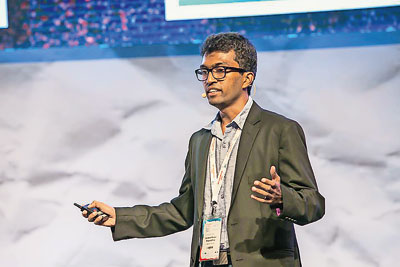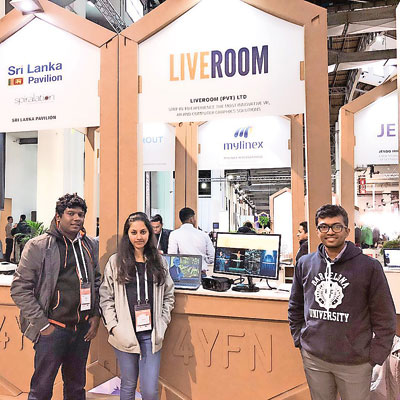Finding the opportunities even through the challenges
View(s):- The Mirror Magazine continues its series on young entrepreneurs and their journey through these pandemic times.
- This week we feature Sameera Nilupul, the founder of LIVEROOM.

Sameera
Teleporting you to another place, another world, another time all while you are seated on your home sofa is the magic behind augmented and virtual reality. Liveroom is one of the pioneer Sri Lankan companies that was able to reach the global market in this field. The Mirror Magazine invited the founder behind this corporation, Sameera Nilupul to discuss his thoughts on navigating through a pandemic
1. How did the pandemic impact your work?
So we were used to working at one location. So because of that, we have several teams where they were used to work together, but when the lockdown happened the main hurdle was for us to adjust to the new working from home conditions. Also, some clients had to cut their budgets as well, so then there were some kind of financial issues too. But somehow we managed to overcome them.
2. How did you manage to adjust your business according to the emergency situation?
So what we did was one week before lockdown, we anticipated a situation, as almost all of our clients are overseas and their countries were starting to lockdown. Then we ordered Internet routers for everyone and one week before the lockdown, we sent everyone home. So there were no issues and we had the connectivity to work from home as we responded early.
3. What were the biggest challenges your company had to face due to the pandemic and how did you overcome them?
The biggest hurdle was adjusting to working from home. But we managed because we were used to doing online calls with our foreign clients. So there was not that much of a problem when it comes to moving from an office-based environment to working from home. But our teammates were working from different locations, so there were power cuts and issues like that, but then again, we started working on a schedule, everyone shared their calendar, then we scheduled calls for each team. We have a scheduled call every day, so that helps us to sync all the people, for example, at 8 am, there is a call for a certain particular task, so everyone has to attend that call, therefore everyone is in sync with what’s going on. So that’s how we did it.

LIVEROOM team at an overseas exhibition
5. With the pandemic situation practically everything was shifted online, how do you think augmented and virtual reality will contribute to this online life?
It has a huge role, for example, we work in the retail space for augmented and virtual reality, so what we have is a platform where online sellers can create their own virtual shopping experience. They can scan their products using the mobile app, and then they can visualize those products in 3D or AR to their customers through our platform called OGMO. They can do it in several ways, they can integrate it into their e-commerce websites, so a particular person who goes to your website can try your products in 3D or AR. So we saw a huge potential and a huge market in this particular area after the pandemic. Before the pandemic, people did not care much about having their online presence or visualize their products to customers because anyway, the customers had the freedom to visit the showrooms anytime. Due to the pandemic, we saw a huge demand for these new technologies, AR and VR. The latest iPhones and Android phones were supporting native augmented reality, so there was not that much of an issue to introduce it. I think if the pandemic had happened, maybe five years ago this thing would not have happened because of the technologies behind five years. So the pandemic happened at the right time in the technology field as well.
7. How do you think covid-19 has molded the future of the business field you are functioning in?
In our field earlier our foreign clients were hesitant to outsource work, they preferred working with closer countries. For example, if you take the Nordic region they chose companies in Ukraine or Eastern Europe, over companies in Asia because it was easier for them to travel, because of the pandemic the geographical barrier is not there anymore as they cannot travel to either Ukraine or Sri Lanka. As the geographical issues are not there anymore they are shifting to other options. So Covid-19 managed to break that mentality of the clients.
8. What advice would you give as an entrepreneur to those who are skeptical about initiating a startup due to the current situation?
Actually, this is the best time to start a business. If everything is saturated some big players are controlling the market, assume if you started sanitation or a mask business in December 2019, after foreseeing this situation, you would have probably been a millionaire by now. These kinds of situations are really good for startups because it creates a lot of opportunities as larger companies take time to adjust but smaller companies can thrive. So I think now is a really good time to start a business.
(BK)



